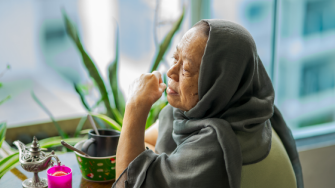
Co-Director of UNSW Sydney’s Centre for Healthy Brain Ageing (CHeBA), Professor Henry Brodaty, will join a team of researchers, multicultural community organisations and public health campaigners to deliver a program aimed at decreasing stigma and increasing help-seeking for dementia diagnosis.
The project, led by University of Sydney’s Professor Lee-Fay Low, received more than $1.5 million from Australia’s National Health and Medical Research Council (NHMRC) to use community-based participatory approaches to co-design, implement and evaluate a public health campaign specifically intended for Chinese, Vietnamese, Indian and Arabic communities across South-Western Sydney.
People from culturally and linguistically diverse communities, or specific cultural subgroups, may experience different patterns of disease and health risk factors as well as facing challenges with access to and use of services, according to the Australian Institute of Health and Welfare (AIHW).
Stigma – which comprises stereotyping, attitudes and behaviours toward a group or condition - culture, past experiences and service availability all contribute to delayed diagnosis.
Professor Henry Brodaty, internationally acclaimed in the field of ageing and dementia research, explained that a delayed dementia diagnosis may result in suboptimal dementia management.
In Australia, there is an average gap of 1.9 years between recognition of symptoms and first health professional consultation for dementia. This gap is likely far greater in people from CALD backgrounds as is evident by their dementia being more severe at first diagnosis compared to white Caucasians," said Professor Henry Brodaty.
“Delayed help-seeking means later assessment for reversible causes of cognitive decline and delayed advice on how to live well with dementia,” says Professor Brodaty.
These factors also cause delays in accessing carer support programs which ultimately can decrease carer stress and lower the risk of institutionalisation for the person living with dementia.
Professor Lee-Fay Low said people from CALD backgrounds are heavily under-represented in Australian dementia research and that this project looks to address both the research equity problems as well as the health equity issues.
“Dementia stigma is deeply embedded in many cultures and is one reason for not seeking help,” explains Professor Low.
Given the common terms used for dementia in Chinese, Arabic and Vietnamese translate to ‘insane and idiotic’, ‘unravelled,’ and ‘confusion related to retardation’, it is clear that addressing stigma may require the revision of such terms," said Professor Lee-Fay Low.
“Including patients from diverse cultural, ethnic and linguistic backgrounds and their families in dementia research is fundamentally important to understanding and responding to their specific needs,” says Professor Anne Kelso, NHMRC CEO. “The results of the funded projects will deliver real change in the lives of these members of the Australian community by directly informing improvements to policy, programs and health services for people living with dementia.”
